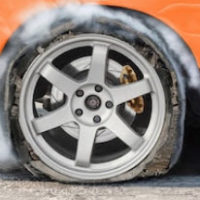Yokohama Tire Corp. Voluntarily Recalls 529 RY023

In December of last year, Yokohama Tire Corp. issued a voluntary recall related to their 529 RY023. The recall affected some 529 tires manufactured by the company. Yokohama said that the rubber that the tires were designed with provided inadequate adhesion between the treads and the body of the tire and had the potential to result in tread separation. The tires were manufactured in June of 2018. Yokohama alerted the NHTSA to the potential danger involved with the tires.
Yokohama had offered to replace the tires free of charge but only gave drivers sixty days after the memo was posted to take advantage of the free replacement. At this point, the 60-day replacement window has elapsed. However, Yokohama had issued notices to drivers and dealerships concerning the tire.
Radial Tires and Tread Separation
Between the treads and the body of the tire lies a steel belt which serves the function of reinforcing the tire and preventing random road debris from perforating the body of the tire. While this technology has made tires much stronger, the process of bonding steel to rubber is fraught with a number of difficulties. Some of these difficulties are environmental while others undergird the sheer complexity of producing a substance that will do the job correctly. In cases where the tread inexplicably separates from the body of the tire, one of the most obvious culprits is that the adhesion process didn’t completely take.
The adhesive used in this process also must be suitable to weather a number of conditions. For instance, tires rotating on the road for extended periods of time will get hot. If this causes the adhesive to break down, the treads can separate causing catastrophic tire failure.
How Heat Destroys Tires
Excessive heat can be a major issue for your tires. Firstly, it causes your tire pressure to increase putting more pressure on the tire body from the inside. This overinflation can make your tire more susceptible to blowouts. You have to keep an eye on your tire pressure monitor system on days when it’s very hot or very cold.
A second problem with heat is that it will cause the rubber to harden over time making it degrade faster. The harder your tire is, the more likely it is to suffer a catastrophic failure. When you purchase a new tire it is soft and the treads and sidewalls are supple. Rubber will degrade over time and heat will help it on its way. That makes tread separation and sidewall failure much more likely.
Lastly, intense heat will disrupt the adhesive that bands your treads to the main body of the tire. When the adhesion breaks down completely, tread separation results causing the tire to basically shred and deflate. If you’ve ever seen pieces of a tire along the highway, you can bet that tread separation is likely to blame.
Talk to the Tire Defect Attorneys Today
You have a responsibility to monitor your tires, but the company that manufactured them has a responsibility to ensure they produce a safe product. If they have failed in that duty of care, contact the Coral Gables tire defect attorneys at Halpern, Santos & Pinkert for a free consultation.
Resources:
cfpub.epa.gov/ncer_abstracts/index.cfm/fuseaction/display.highlight/abstract/6997
tractionnews.com/yokohama-tire-announce-recall-certain-ry023-truck-tires/
https://www.tiredefectattorney.com/what-your-tire-pressure-monitoring-system-is-trying-to-tell-you/
